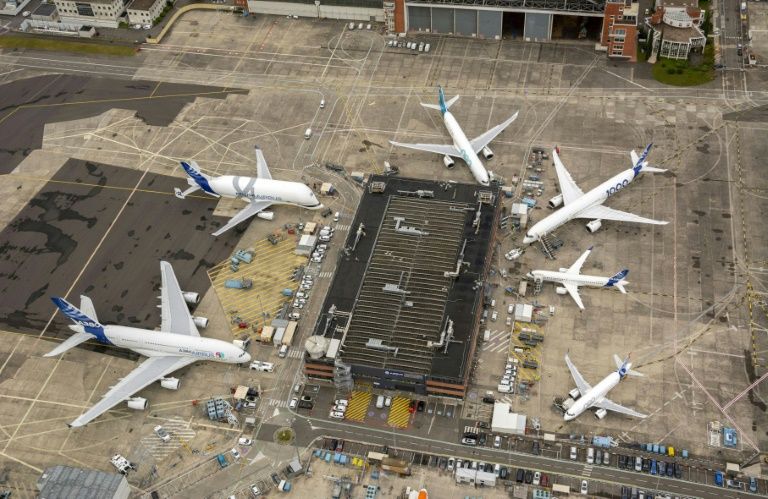France pledges 15 bn euros for stricken aviation firms
()
Airbus aircraft at the firm’s Toulouse headquarters — the company supports hundreds of suppliers and service providers but the coronavirus virus has seen scores of orders cancelled or put on hold . ©Airbus/AFP/File Jean-Vincent Reymondon
The French government on Tuesday pledged 15 billion euros ($16.9 billion) for the country’s aviation industry, where thousands of jobs are on the line as the coronavirus crisis hammers the travel industry.
“We are declaring a state of emergency to save our aeronautics industry so that it can be more competitive,” Finance Minister Bruno Le Maire said at a press conference in Paris.
“If we hadn’t intervened right away, a third of the jobs in the sector would have disappeared… that’s around 100,000 of the 300,000 direct and indirect jobs in the sector,” he added.
The southwestern French city of Toulouse hosts the headquarters of pan-European aircraft maker Airbus, which for decades has supported hundreds of suppliers and service providers in the region.
But orders are being cancelled or put on hold indefinitely as airlines worldwide ground planes amid the travel restrictions, with many fearing it could take years to recover in case of strict new hygiene rules — such as requiring middle seats to remain empty.
Airlines have parked up to 90 percent of their aircraft, some 4.5 million flights have been cancelled so far, and an estimated $314 billion in revenues will be lost this year, according to the International Air Transport Association (IATA).
The International Civil Aviation Organization, for its part, estimates the pandemic will reduce the number of airline passengers by 1.5 billion by the end of the year.
The French government has already announced that Air France-KLM, which posted a 1.8-billion-euro loss in the first quarter, will get seven billion euros in loans either directly from the state, or backed by it.
That money will allow it to go through with a purchase of 60 Airbus A220 airliners and 38 long-haul A350 jets. Both planes offer fuel efficiencies and fewer carbon emissions, a growing concern among environmentally-conscious flyers.
– ‘Not the village idiots’ –
The French state and Airbus, as well as Dassault Aviation, Thales and Safran, will contribute 200 million euros each to a fund for small and midsize firms, in particular to help them invest in carbon-reduction technologies.
The plan also includes 1.5 billion euros to spur research on a future “carbon neutral plane” over the next three years, with a goal of having the plane in operation by 2035, Le Maire said.
Defence Minister Florence Parly, who attended Tuesday’s press conference alongside Environment Minister Elisabeth Borne, said 600 million euros of planned military orders would be accelerated, including the purchase of three Airbus A330s that will be converted to refuelling planes, and eight Caracal troop transport helicopters.
The military will also double its orders reserved for small and midsize firms, to some 100 million euros, to develop light surveillance planes and drones, “ensuring 1,300 jobs for the next three years,” Parly said.
Le Maire brushed off concerns that the United States or other countries would protest the state aid as unfair help, amid a long-running feud at the World Trade Organization over subsidies to Airbus and its American rival Boeing.
“We’re not going to be the village idiots who let hundreds of thousands of jobs be destroyed, and the skills they represent… by saying ‘sorry, those are the rules, we have no choice’,” he said.
“We play by the international rules, but we also note that the American government is massively helping its aviation industry, which is perfectly understandable, and it seems that China is doing the same,” he said.
Governments worldwide have provided airlines with $123 billion to help weather the coronavirus storm, the IATA said last month, though it warned the assistance was adding to surging debt levels that would eventually need to be repaid.
The support for the aviation sector comes after French President Emmanuel Macron promised last month eight billion euros for the auto sector, with a focus on developing the electric vehicle market.
Mathieu RABECHAULT
(AFP)
Disclaimer: Validity of the above story is for 7 Days from original date of publishing. Source: AFP.


